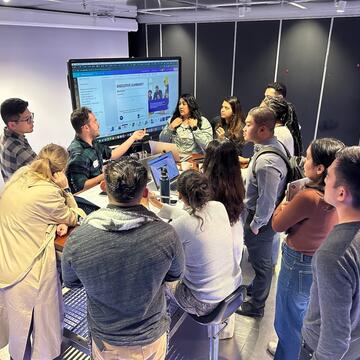
Experiential Learning
Experiential learning is at the core of USF's MBA Program. We believe in the importance of academic work that can be put into practice outside the classroom, whether at a job interview, in a summer internship or with a client-facing project.
USF puts you close proximity to the biggest companies in the Bay Area giving you unparalleled opportunities to gain real-world experience in a new role. You will network with organizations across different industries, and build strong relationships with prospective employers.
We've designed our Part-Time MBA to emphasize experiential learning through a few key Program components.
-
The Innovation Project is part of every MBA student's experience. As a part-time student, you'll conduct your Innovation Project during the fall of the second year, either independently or with a small cohort. Each student's project plan is submitted to and approved by the faculty board. The Innovation Project carries 2 credits and is a graded component of the program.
Project Objectives
- Choosing a project that carries relevance and value for your career plans: The Innovation Project will demonstrate the application of concepts learned in the MBA Program, as well as a clear connection between your work as a student and your professional field of interest.
- Think strategically and work creatively: Whether electing to work alone or with a small group, your project should show creative applications of what you've learned in the classroom to come up with innovative solutions for your client.
- Gain influential references from the company – and the people- with whom you work: Plan for post-graduation success with recommenders who worked with you and experienced for themselves how you contribute to a team.
- Share your unique experience with other students: During USF's annual Social Entrepreneurship and Innovation Week (SEIW), students publicly present the outcomes and takeaways through a comprehensive report on their Innovation Project. The SEIW is held each spring.
-
Inspired by the Jesuit concept of ‘Magis’ (discernment, generosity, wise choices, and service to a community), MBA Magis culminates the MBA experience. Students compete in a challenging cross-disciplinary business simulation, engage in structured reflection, interact with guest speakers, and jointly identify and perform a community service project. Students complete and review the Management Exercises to discern how much they have accomplished and intend to accomplish, and articulate what more they can do - in either small or grand ways - to unlock the potential of what already exists.
-
For students interested in consulting, the Malloy Group provides a valuable consulting experience by connecting students with the Bay Area’s most notable startups, from early to late-stage, on real-world projects.
Whether you're interested in application software, healthcare, SaaS, consumer products, or retail industries, the Malloy Group has a successful history of collaborating with the most innovative and cutting-edge companies.
And when it comes to preparing for success for after you graduate, the Malloy Group plays a key part in setting your resume apart from the rest, and in demonstrating you as an experienced professional who can make invaluable contributions to today's dynamic workplace.
-
Understand how business and life are conducted in diverse international settings. Get firsthand insights into global business practices, cultural nuances, and economic environments. Engage with local business leaders, visit multinational corporations, and explore the challenges and opportunities of conducting business across borders. You'll build valuable international networks and develop a deeper appreciation for global business dynamics as you navigate in an increasingly interconnected world.
Previous AGI programs have taken students to dynamic locations such as the United Arab Emirates, Belgium, Italy, Spain, the UK, the Netherlands, Chile, and many more.
Learn Consulting on the Fly
On a working immersion in the Netherlands, 16 graduate students from the School of Management visited eight organizations in eight days. At each stop, students listened to the client describe its challenges, brainstormed, formed teams, “normed” or tested their ideas, and then pitched their solutions to the client — all in about two hours.
